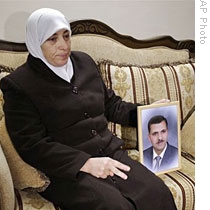Jerusalem
19 March 2009
 |
| Hudah Shaer, the wife of former Palestinian Authority Deputy Prime Minister Nasser Shaer from Hamas, holds his portrait in their house in the West Bank city of Nablus, 19 Mar 2009 |
Hamas officials labeled the arrests an attempt by Israel to punish the group after the two sides failed to reach a deal for a truce in indirect negotiations for a prisoner swap brokered by Egypt.
Israel had sought to win the release of Gilad Shalit, a soldier seized by Palestinian militants and taken to the Gaza Strip in 2006. Talks broke down when Israel refused to hand over all of the Palestinian prisoners that Hamas wanted released - some of whom included people involved in terror attacks that killed Israeli civilians.
Among those arrested in the Israeli-occupied West Bank were four Hamas members of the Palestinian Legislative Council and a university professor.
A statement from Israel's military said those detained were leaders of an ongoing effort to restore the administrative branch of Hamas, which Israel considers a terrorist organization.
The group does not recognize the Jewish State's right to exist and has called for its destruction.
In remarks carried by Israeli radio, Hamas lawmaker Moushir al-Masri condemned the arrests.
He accused Israel of trying to blackmail Hamas, an effort he vowed will fail.
The collapse of negotiations this week adds uncertainty to the future of the conflict. A low intensity war has continued along the Israel-Gaza border, with militants firing rockets into Israel and Israeli forces responding with periodic air strikes against targets in Gaza.
With no permanent truce in place, the breakdown of the talks opens the possibility of a renewed full-scale offensive in Gaza.
Israel says it will not lift its blockade on the border crossings into the Gaza Strip, something that is preventing reconstruction efforts from getting under way following the recent 22-day Israeli assault on militants in the enclave.
Further complicating prospects for peace in the Gaza Strip is the split between Hamas which controls Gaza and the moderate Fatah faction that governs the West Bank. Talks between the Palestinian groups ended inconclusively in Cairo. Participants said they would resume negotiations at a later, unspecified date.